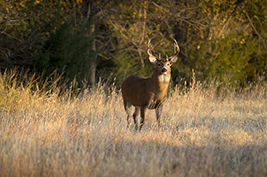AMES, Iowa – In an effort to better educate Iowans on how to manage white-tailed deer and the spread of the challenging Chronic Wasting Disease that impacts their populations, Iowa State University Extension and Outreach is partnering with the Iowa Department of Natural Resources to offer two sessions of the educational program Chronic Wasting Disease Ambassadors.
Chronic Wasting Disease “ambassadors” will be trained in the science-based management of CWD, both prevention and testing, and how to educate others within their community by wildlife biologists from Iowa State and the Iowa Department of Natural Resources. Participants can include hunters and non-hunters, community members and anyone interested in wildlife conservation.
“This will be our second year of CWD Ambassadors and we’re very excited to grow our team of talented, knowledgeable Iowans that can help spread the word about CWD management in the state,” said Adam Janke, assistant professor in natural resources ecology and management and extension wildlife specialist at Iowa State.
Two offerings are planned for 2022. The first will be held at the ISU Extension and Outreach Greene County office in Jefferson on June 9, 16 and 23. The second offering will be held at the ISU Extension and Outreach Wayne County office in Corydon on Sept. 13, 20 and 27.
The course includes three in-person meetings from 6-8 p.m. and two online lessons completed between the in-person meetings. Online lessons allow participants to review materials on the science of the disease and effective communication strategies, before participating in hands-on activities in the classroom sessions. Graduates are given resources to help spread the science of CWD management in their own communities.
“We need hunters, landowners and community leaders engaged in the management of the disease to reduce its spread and reduce potential threats to people and other industries impacted by deer and deer hunters,” said Janke. “This program seeks to train community leaders to go out and be good ambassadors and lead community responses to CWD.”
Registration is available at https://iastate.qualtrics.com/jfe/form/SV_82ZzT2MS5T0FSxU by contacting course facilitator Adam Janke. Registration will be open until the week before the courses open, or until the classes are filled (25 people).
A light meal and refreshments will be served at each class session. Sessions will include instruction on the ecology of the disease, hands-on exercises, sampling for the disease and networking with wildlife biologists in the region. The class will conclude with discussion and resources for the graduates to return to their communities and share. For more information, Janke can be reached at 515-294-7429 or [email protected].
CWD facts
CWD is in a class of diseases called Transmissible Spongiform Encephalopathies that lead to neurological degradation in the infected animals. Other familiar TSEs include Bovine Spongiform Encephalopathy (“Mad Cow Disease”) and Scrapie, that affects sheep.
The disease is 100% fatal in deer but infected animals are asymptomatic for months/years after exposure. They can and do transmit the disease during the asymptomatic period.
Areas of Wisconsin that have had the disease for decades show prevalence rates among adult male deer around 40%.
Because of the uncertainty of how TSEs spread, the Centers for Disease Control and Prevention advise against consumption of CWD-positive deer.
CWD was first found in wild deer in Iowa in 2013. Today, it has been found in wild deer in at least 12 counties.
New Ambassadors Sought to Help Fight Chronic Wasting Disease in Iowa White-tailed Deer
May 26, 2022

Ricardo Reitmeyer/stock.adobe.com • Contributed Photo
This large White Tail Buck had been spending some time in the grass field along a tree line in Kansas. Late Autumn and early Winter is the rut season for deer in this region.
